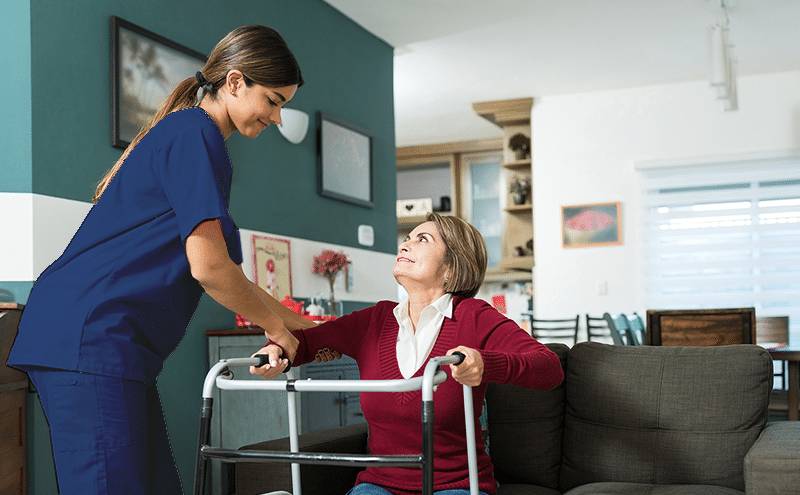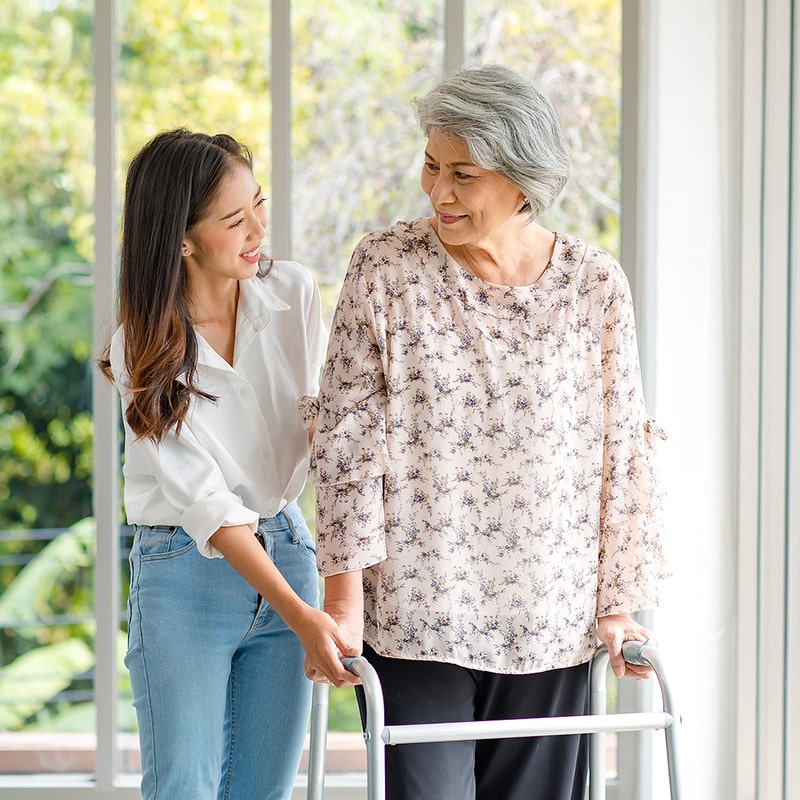Parkinson’s Home Care
The word Amana means “faithfulness, loyalty, constancy, devotion, integrity, trust.” It also means “support, confirmation; a guardian.” At AmanaCare, our goal is to confirm the inherent value of our clients and to support them through their unique circumstances. By providing constant, reliable care tailored to each person, we seek to be the guardian that they and their loved ones can trust. Every person is a unique gift from God, and therefore care is not one-size-fits-all. We craft our care plans to assist with your specific needs, the way you want them done. We set your care plan according to family needs and help you remain an active member of your family and community.
Receiving a diagnosis of Parkinson’s disease can be life-changing. As symptoms progress, daily activities may become increasingly difficult. However, with the assistance of compassionate in-home caregivers from AmanaCare In-Home Assistance, those living with Parkinson’s can continue enjoying independence within the comfort of home.
Parkinson’s Home Care Services Include:
- Personal Care Services
- Companion Care Services
- Respite for Family Caregivers
- Mobility Assistance
- Full-Time Home Care
- Part-Time Home Care
Benefits of In-Home Parkinson’s Care
Receiving Parkinson’s care within a familiar, comfortable home environment provides numerous advantages for overall health, safety, and emotional well-being. Benefits include:
- Personalized Care: In-home caregivers get to know clients as individuals rather than patients. They provide customized assistance based on the unique needs, preferences, and changing priorities of those in their care.
- Medication Management: Caregivers ensure medications are taken as directed. They organize, document dosages, refill prescriptions, and communicate with medical providers regarding effectiveness and adjustments.
- Meal Planning and Preparation: Caregivers can provide nutritious, balanced meals catering to specific dietary needs while also accommodating challenges those with Parkinson’s frequently face including dexterity issues, loss of sense of smell or taste, or medication side effects.
- Mobility and Safety: Caregivers implement exercise regimens to maintain flexibility, strength, coordination, and balance. They also ensure safety measures are in place including clearing potential fall hazards and installing grab bars, railings, ramps or other adaptive devices.
- Socialization and Companionship: In-home caregivers provide meaningful social connections through conversation, games, shared interests, community outings, or other engaging activities. Ongoing interaction helps minimize isolation and depression.
- Respite for Family Caregivers: Caring for someone with a neurodegenerative disease like Parkinson’s can be physically and emotionally draining. Respite care offers family caregivers a necessary, guilt-free break so they can recharge and avoid burnout.
Providing Parkinson’s Home Care in Lincoln, Kearney, Grand Island, North Platte, Hastings, Omaha, Columbus, Broken Bow, Scottsbluff, Norfolk, and surrounding areas.

Understanding Parkinson’s Disease
Parkinson’s disease is a progressive nervous system disorder affecting movement and coordination. It occurs when nerve cells in the brain slowly break down or die over time. These cells produce dopamine, a chemical messenger vital for smooth and fluid movement. As dopamine levels deplete, individuals experience a range of motor and non-motor symptoms.
Common motor symptoms include tremors, muscle rigidity, slowness of movement (bradykinesia), impaired balance and coordination, shuffling gait, and reduced facial expressions. Non-motor symptoms may involve sleep disturbances, loss of sense of smell, cognitive changes, mood disorders, fatigue, constipation, and low blood pressure.
While Parkinson’s itself is not fatal, symptoms tend to worsen gradually. The progression rate varies significantly among individuals depending on factors like age of onset and response to medications. Working closely with knowledgeable healthcare providers can help develop customized treatment plans for symptom management.
At AmanaCare, our goal is to confirm the inherent value of our clients and to support them through their unique circumstances. By providing constant and reliable care tailored to each person.

Types of In-Home Care Services for Parkinson’s Disease
Seeking in-home care assistance allows those with Parkinson’s disease to remain comfortably at home while getting needed support. Agencies like AmanaCare In-Home Assistance offer various caregiver services to match clients’ evolving priorities.
Hourly Caregivers
Clients requiring minimal assistance for a few hours a day can access hourly caregiver services. Caregivers help with focused needs like personal care, meals, light housekeeping or provide companionship. Hourly services offer flexible assistance scaled to current abilities.
Live-In Caregivers
For individuals needing round-the-clock care due to advanced Parkinson’s disease, a live-in caregiver allows for attentive support while still living at home. Live-in caregivers manage safety, mobility support, and changing care needs as the disease progresses.
Respite Care
Respite care provides temporary relief for family members as primary caregivers. It allows them a break to focus on self-care while ensuring consistent care for their loved one. Respite care ranges from a few hours to a few days or weeks depending on families’ unique needs.
Tips for Living Well with Parkinson’s Disease
Adjusting daily living and self-care habits can help those with Parkinson’s better navigate disease-related challenges. Useful tips include:
Adopt an Exercise Routine
Consistent physical activity benefits muscle strength, flexibility, stamina, balance and coordination. Options like stretching, walking, water aerobics, dance, yoga, Tai Chi, cycling, strength training (with clearance if severe mobility issues exist) or others boost energy, mobility, confidence, and positive attitude.
Have a Parkinson’s Care Team
Living with Parkinson’s disease warrants support from providers specializing in movement disorders. This collaborative team offers comprehensive disease management by monitoring progression, medications, therapies, and caregiver resources. Team members may include a neurologist, physical and occupational therapist, speech therapist, psychologist, and in-home caregiver agency.
Join a Support Community
Participating in a support community helps individuals and caregivers reduce isolation and cope with challenges through shared understanding from others facing similar experiences. Support groups exist locally nationwide and also thrive virtually.
Adjust Home Layout
Create safer, more accessible home flow by installing grab bars, railings on both sides of stairways, adequate lighting, high-contrast tape on edges, elevated toilet seats, front-rolling walkers, shower benches, and ramps. These adaptations allow easier mobility around familiar environments as symptoms progress.
Use Assistive Gear
Tools like weighted utensils, bowls with suction bottoms, button hooks, long-handled shoe horns, or modified toothbrushes compensate for dexterity loss and promote independence with self-care tasks. Speech devices amplify volume when vocal projection diminishes.
Roles of In-Home Caregivers
Compassionate in-home caregivers are thoroughly trained to handle the diverse daily needs of those living with Parkinson’s disease. Major responsibilities include:
Assisting with Personal Care
Caregivers help with bathing, hygiene, grooming, oral care, dressing, using the facilities, and continence care. They ensure these intimacies are handled with dignity and encourage clients to perform what they can independently to retain life skills.
Supporting Mobility
Caregivers assist clients moving between bed, chair, and bathroom safely. They provide standby assistance when walking, cue to use mobility aids properly, and perform a gentle range of motion exercises to maintain flexibility in limbs prone to rigidity or spasms.
Medication Reminders
Caregivers organize medications by date and time, provide prompts when it’s time to take them, document what was taken, and communicate with doctors about how clients are responding.
Meal Planning, Prep, and Assistance
Caregivers prepare nutritious meals catering to specialized diets, cut up food, open containers, and provide standby assistance during meals along with verbal cueing as needed.
Light Housekeeping/ Homemaker Services
Caregivers tidy rooms clients spend the most time in, do laundry, take out trash, change bed linens, run essential errands like picking up prescriptions, and stock up on grocery staples. These efforts help maintain cleanliness and a safe living environment.
Transportation
Caregivers transport clients to essential medical appointments, physical rehabilitation sessions, community-based activities, religious services, or visits with friends and family. This provides a break for family caregivers.
Socialization and Activity Engagement
Caregivers engage clients in stimulating conversation, play card games, assemble puzzles and provide cues during activities to enable participation, integrate movement exercises during tasks, encourage community interaction to avoid isolation, and create an environment of empathy and support.
We ensure our caregivers are highly skilled and compassionate while giving attention to our clients. With them, you can be sure your loved ones are always safe and have the highest level of care.
We start a client relationship by providing a free consultation where together we can explore your individual needs and offer the most helpful and appropriate care plan.
Frequently Asked Questions About Parkinson’s Home Care
What are the most common symptoms or challenges individuals with Parkinson’s disease face daily?
The most common daily symptoms leading to functional impairment include tremors, muscle rigidity affecting coordination, bradykinesia (slowed movements), impaired balance increasing fall risks, soft speech volume, loss of facial expressions, fatigue, cramped handwriting, sleep problems, and emotional changes like anxiety or apathy.
What specific mobility, flexibility and strengthening exercises help improve function for those living with Parkinson’s disease?
Useful exercises include stretching major muscle groups, balance exercises like tandem stance and single leg balances, core strengthening, walking, marching in place, cycling, Tai Chi, yoga, Pilates, and dance movements. A physical therapist can recommend a tailored exercise program beneficiaries find motivating and enjoyable.
How does respite care help family caregivers caring for someone with Parkinson’s disease manage stress?
Respite care gives family caregivers a necessary break so they can focus on personal needs and avoid burnout from constantly tending to caregiving demands. It provides time to rest, complete personal tasks, engage in self-care activities, spend time with other family members, or take a vacation. This restores mental, emotional and physical resilience to be fully present in their caregiving role.





